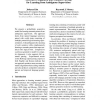Free Online Productivity Tools
i2Speak
i2Symbol
i2OCR
iTex2Img
iWeb2Print
iWeb2Shot
i2Type
iPdf2Split
iPdf2Merge
i2Bopomofo
i2Arabic
i2Style
i2Image
i2PDF
iLatex2Rtf
Sci2ools
104
click to vote
COLING
2010
2010
Generative Alignment and Semantic Parsing for Learning from Ambiguous Supervision
We present a probabilistic generative model for learning semantic parsers from ambiguous supervision. Our approach learns from natural language sentences paired with world states consisting of multiple potential logical meaning representations. It disambiguates the meaning of each sentence while simultaneously learning a semantic parser that maps sentences into logical form. Compared to a previous generative model for semantic alignment, it also supports full semantic parsing. Experimental results on the Robocup sportscasting corpora in both English and Korean indicate that our approach produces more accurate semantic alignments than existing methods and also produces competitive semantic parsers and improved language generators.
Related Content
| Added | 13 May 2011 |
| Updated | 13 May 2011 |
| Type | Journal |
| Year | 2010 |
| Where | COLING |
| Authors | Joohyun Kim, Raymond J. Mooney |
Comments (0)

